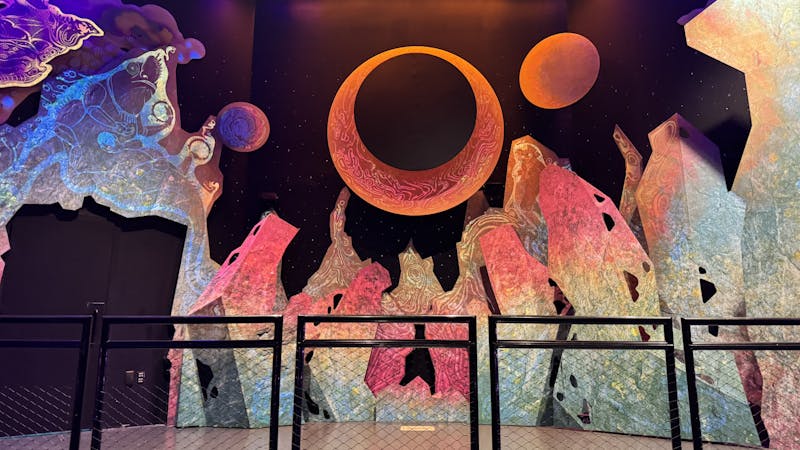Review: ‘The Zone of Interest’ is a chilling portrait of evil

Review: ★★★★★
Films about the Holocaust face an impossible question: How are we meant to render such an atrocity? Countless filmmakers since the end of World War II have tried to answer this question, some – like Steven Spielberg in “Schindler’s List” – answering that we must try to voice its individual stories as much as possible, and others – like Claude Lanzmann in his 9 ½ hour documentary, “Shoah” – answering that it is ultimately impossible.
Director Jonathan Glazer offers a different approach to this question. With “The Zone of Interest,” he replies that we must stare evil right in its face. In doing so, Glazer crafts one of the most powerful cinematic statements on the Holocaust, making his film a necessary watch.
1943, Auschwitz. The idyllic Höss family home lies just outside of the camp. Hedwig Höss (Sandra Hüller) spends her days tending to its large garden of flowers and taking care of her children. She tries on fur coats stolen from prisoners and has tea-time gossip sessions with her friends. Rudolf (Christian Friedel), Hedwig’s husband and the commandant of Auschwitz, spends most of his time tending to bureaucratic matters, signing off orders orchestrating genocide with “et cetera.” In his free time, he enjoys swimming and horseback riding with his children in the wilderness surrounding the camp. Meanwhile, gunshots, screams and cries from the camp make up the ambience alongside birds singing and the Höss children laughing. The atrocities not even twenty meters away have just become mere background noise.
Glazer doesn’t try to dramatize or sensationalize Auschwitz. The film’s cinematography is cold, bleak and distant; cameras are either seated on tripods or bolted to walls, voyeuristically watching the Höss’ routines. Glazer does not show any graphic violence or gore, but rather implies it through sound, smoke and shadows. The interior of the camp is never shown, only amplifying the film’s looming sense of terror – the camera assumes the Höss’ ignorance, showing how mundane they treat their lives in the presence of pure evil as the concentration camp’s presence still lurks in every scene.
The film draws from the concept of “the banality of evil” coined by political theorist Hannah Arendt in her reportage of the Nuremberg Trials. She argued that evil is not always monstrous or irrational but often the result of ordinary people following orders, routines and norms without questioning their morality or consequences. Glazer shows us how the Hösses have integrated atrocity into their everyday lives and how they have dismissed it from their “zone of interest.”
Glazer’s film functions as a reminder of the Holocaust and what allowed it to happen in the first place: the transformation of evil into something banal. With a stroke of great self-awareness, Glazer argues that we’ve turned the banality of evil into just another banality and another concept to be poked and prodded at with sterile intellectualizing and abstract philosophizing. In this sense, atrocity has been dismissed from the ‘zone of interest,’ just like what the Hösses have done with the evil that lies just over their garden wall.
Critically, Glazer’s film has not gone unrecognized – “The Zone of Interest” won the Grand Prix at this year’s Cannes Film Festival and has been nominated for five Academy Awards, including Best Picture. However, it’s important to see the film beyond its technical prowess or mastery of craft, and to see it for what it really is – a deeply alarming statement about recognizing evil. There is a profound, nauseating darkness to “The Zone of Interest,” and while it certainly isn’t an easy watch, it is absolutely necessary to see.
More from The Rice Thresher

Thresher’s guide to arts and entertainment in Houston
New to the city? Unsure how to spend your time procrastinating on homework? You’re in luck — Houston is a playground if you know where to look, and most of it is an easy metro ride or short commute from campus. Here’s a starter pack of spots that deliver fresh air, brain food and the occasional “wait, this is in Houston?” moment.

Thresher’s Lollapalooza report: Who ruled Grant Park?
Chicago’s Grant Park ran on pure dopamine this weekend — surprise debuts, late-but-worth-it arrivals, confetti, fireworks and at least three mass sing-alongs an hour. From Joey Valence & BRAE road-testing new indietronica to A$AP Rocky cracking open his vault, T-Pain turning the field into karaoke and Olivia Rodrigo summoning Weezer, Lollapalooza felt like a live-wire mixtape. Doechii built a universe, TWICE made history and Sabrina signed off with a superstar-cementing finale. Here’s what actually lived up to the skyline.
“Ginny & Georgia” Season 3: A Messy, Magnetic Villain Origin Story
I’ll admit it: I came into “Ginny & Georgia” expecting another glossy Netflix soap that looks great in a weekend binge but evaporates from memory by Monday. By the end of season three, I realized I’d been doing something I rarely do with shows like this: I was taking notes. Not on the plot (though it’s as twisty and outrageous as ever), but on the characters. I loved them. I was grinning from ear to ear watching them scheme, stumble and monologue their way through impossible situations. That’s when I knew: this show had done something right.


Please note All comments are eligible for publication by The Rice Thresher.